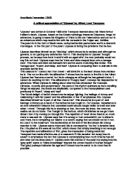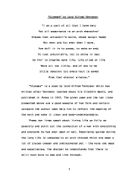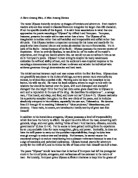The caesura in ‘I cannot rest from travel: I will drink life to the lees’ shows how restless he is. The run on line with the alliterative ‘l’ shows how he wants to live life to the fullest. Ulysses has ‘become a name’, but he is unhappy as although he has gained status, it cannot do anything for him. The alliteration in ‘Hungry heart’, conveys his desperation for adventure. When Ulysses is talking about what he has witnessed: the ‘manners. Climates, councils and governments’, the pace of the rhythm quickens as he is recalling things he enjoyed, the words are disyllables, compared to the monosyllables used previously in ‘hoard’, ‘sleep and feed’.
The ‘drunk delight of battle’ shows how he enjoys fighting, the feelings of victory and celebrating it with his ‘peers’ and the alliteration of the ‘d’ emphasizes this. Ulysses describes himself as ‘a part of all that I have met’. This shows he is a part of, and belongs to history as a result of the battles he has fought in. For Ulysses, ‘experience is an arch wherethro’ Gleams that unraveled world whose margin fades for ever and ever when I move’. Through this he is showing us that, the more we know, the more we realize we do not know. The ‘margin’ is the horizon, which diminishes as we get more distant from it by moving on through life. The repetition of ‘ever’ show there is so much more to see and do. Ulysses says that it is wrong to ‘rust unburnish’d, not to shine in use! Here, he is comparing our talents to a sword, saying that we should not let it rust, but use it to the maximum. The exclamation at the end of the line shows his strong reaction to this. Ulysses wants more and this is conveyed by ‘ As tho’ to breathe were life. Life piled on life were all too little’, which shows that simply breathing is not enough. The repetition and alliteration of ‘life’, gives the impression of being restricted.
Tennyson has made effective use of a caesura in ‘Little remains: but every hour is saved’ to emphasize the fact that Ulysses is contemplating how much time he has left and what can be done about it. Ulysses ends this section of the poem by saying how his ‘gray spirit’ wants to ‘follow knowledge’ ‘beyond the utmost bound of human thought’. The ‘gray’ perhaps indicates his age and it shows how he wants to do more than is possible.
The poem now turns its attention to Ulysses son, Telemachus, who is ‘Well loved’. The language Tennyson uses, reflects his qualities, such as the assonance in ‘slow prudence’ and ‘mild’. The reader can see that Telemachus will make a good leader as he can ‘subdue’ the ‘rugged people’, ‘to the useful and the good’.
The third topic of the poem, is centered around Ulysses’ Mariners. The scene is shifted, as Tennyson asks us to focus on the port: ‘There lies the port’. Ulysses describes him mariners as ‘Souls that have toil’d and wrought and thought with me’. Tennyson creates a sense of mystery with: ‘There gloom the dark broad seas’. This shows that Ulysses wants to explore beyond them. The trochee at the beginning of the line and the rhyme of wrought and thought show how highly Ulysses thinks of them. The contrasting images of ‘thunder and sunshine’ show how the mariners were there for Ulysses through good and bad times. By starting the line with ‘Death closes all: Tennyson makes it emphatic and shows how Ulysses wants to make the most of his life. Ulysses says that ‘some work of noble note can be done’ which will suite him as he has noble qualities. The assonance in ‘Long day wanes’ and ‘slow moon climbs’ drags the line down and shows how time is running out. The run – on line ‘come my friends ‘Tis not too late’ shows how Ulysses is trying to win over his mariners, into one more battle. The ‘purpose holds’, shows that they are soldiers. Ulysses’ main aim is to reach the ‘Happy Isles’ to see ‘Achilles, whom we knew’.
The ‘one equal temper of heroic hearts’, shows the strength of the mariners and Ulysses. The last line of the poem ‘ To strive, to seek, to find and not to yield’ is a very regular iambic rhythm and enforces the sense of heroism.
In conclusion, Tennyson, through effective use of alliteration and assonance, helps us to understand Ulysses’ need for adventure and to be reunited with his friend Achilles.







